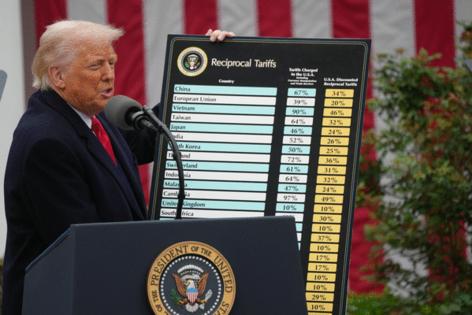Lynn Schmidt: Call Trump's tariffs whatever you want, but don't call them 'conservative'
Published in Op Eds
There are a lot of things that one could say about President Donald Trump’s tariff policies, but one way you should not describe them is conservative. They represent views opposite from true conservative economists such as the gold standard: Milton Friedman (economics pun intended).
As of April 15, the following tariffs from the second Trump administration are in effect: 145% on most Chinese imports (with some exceptions, like smartphones, which face a 20% tariff), 25% on imported vehicles, 25% on all steel and aluminum imports, 25% on imports from Mexico and Canada that are not compliant with the United States-Mexico-Canada Agreement, 10% on energy imports from Canada, 10% on imports of potash (a popular fertilizer) from Canada or Mexico, and a 10% baseline tariff on nearly all imports.
Economists are warning of the dire situation the American and global economies are headed towards as this trade war continues, using terms like recession, higher inflation, increased unemployment, and even possible stagflation.
This sentiment is already trickling down to the public. During this month of April so far, gold prices have soared, with investors flocking to gold as a marker of panic. Consumer confidence has plummeted 11% to the second-lowest level on records going back to 1952.
While not ideologically based, Trump has always looked fondly on tariffs, or at least since the 1980s, when he first started talking about them. It’s hard to know what Trump’s ultimate motives are in this trade war, but his narrative thus far has been to return manufacturing to the United States.
While that might sound good on paper, putting the markets under the control of one individual takes the freedom out of free markets and will certainly bring higher costs to Americans.
Many free market conservatives, like myself, reference Leonard E. Read’s classic essay from 1958, “I, Pencil.” It describes the countless individuals and resources it takes to make a pencil — and how there is “no single person on the face of this earth” who can, by themselves, make a pencil.
Read goes through all the thousand steps involved in making a pencil, from the mining of the ore that makes the saw which cuts down the cedar trees, all the way to components of the eraser, from the rubber-like product from Indonesia to the pumice from Italy.
Read also instructs how there is no mastermind in manufacturing of goods, nor should there be. And how Adam Smith’s “Invisible Hand” from his book “The Wealth of Nations” — which interestingly enough was written in 1776 — takes over and guides and governs the markets, which benefits all.
Many, including myself, worry that Trump’s hand in the economy will be grossly inferior to Smith’s invisible one.
In 2008, Lawrence W. Reed, president of the Foundation for Economic Education, wrote the following introduction to “I, Pencil”:
“In our midst are people who think that if only they had government power on their side, they could pick tomorrow’s winners and losers in the marketplace, set prices or rents where they ought to be, decide which forms of energy should power our homes and cars, and choose which industries should survive and which should die. They should stop for a few moments and learn a little humility from a lowly writing implement.”
Unfortunately for us, one characteristic Trump is not known for is his humility.
Trump is correct that U.S. manufacturing has dropped over time. According to the U.S. Bureau of Labor Statistics, the share of manufacturing employment in the U.S. has steadily declined from 31% in 1970 to 9.7% in 2023.
But even if companies tried to manufacture more goods here in the U.S., there would likely be a void in finding workers to do those jobs. The Cato Institute’s 2024 Globalization and Trade Survey found that 80% of Americans think the country would be better if more Americans worked in factories — but only 25% think they would personally be better if they worked in a factory.
With those numbers, it is hard to see where the workers will come from, since an overwhelming majority of Americans don’t want them, coupled with the current restrictions on immigration.
Currently, a 12-pack of pencils sells at Target for just $2.99, which comes out to a fraction under 25 cents per pencil. It is impossible to know how much that same pack of pencils will cost if they and all their components are only produced here in the United States, but surely it would cost a lot more than three dollars for a dozen.
There is a broader conversation happening around what the term “conservative” means anymore or even what the ideology of the Republican Party is beyond a single man. But when it comes to economic policy, I fear that Americans will endure the costs of Trump’s agenda.
____
_____
©2025 STLtoday.com. Distributed by Tribune Content Agency, LLC.




























































Comments